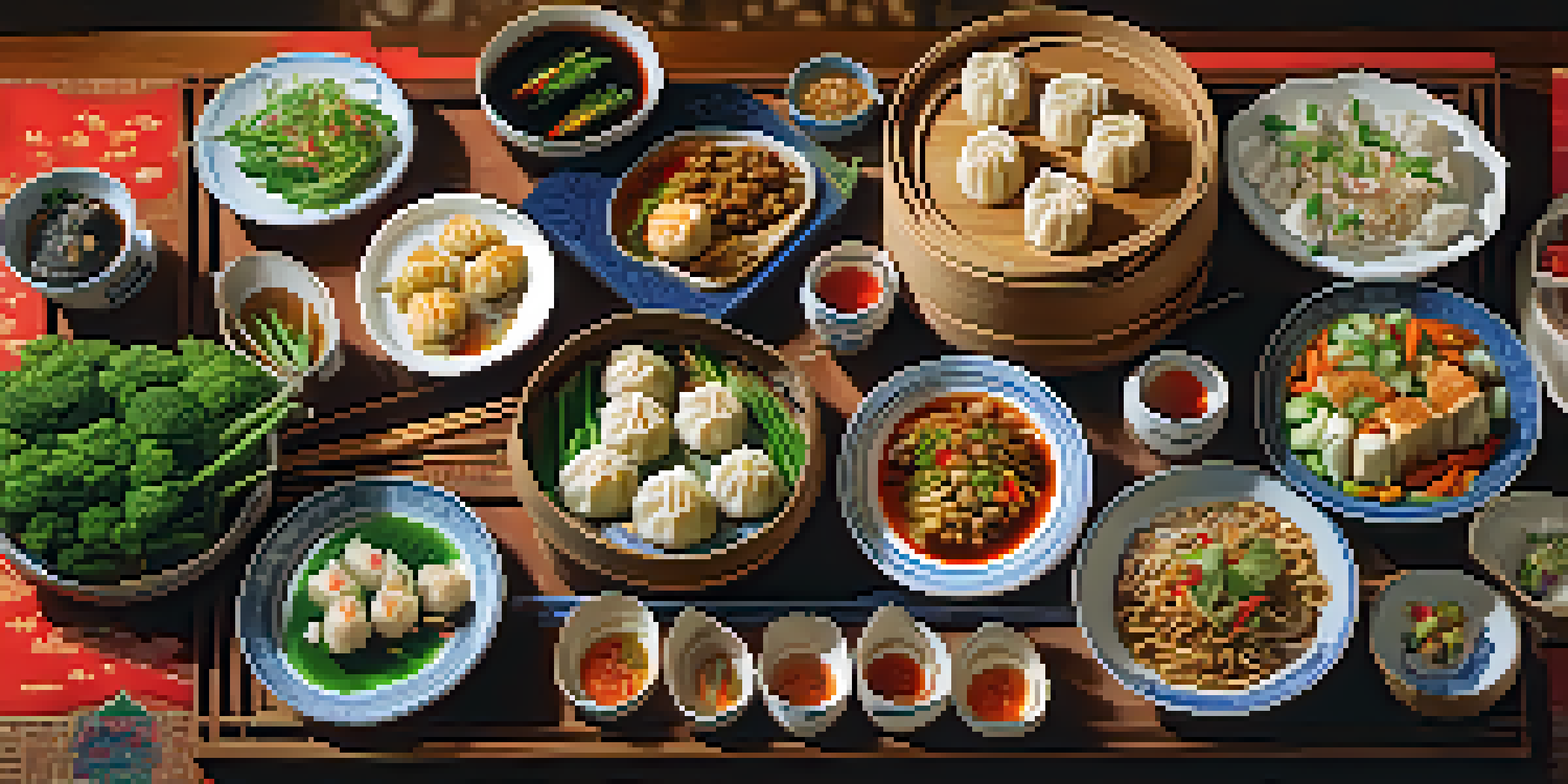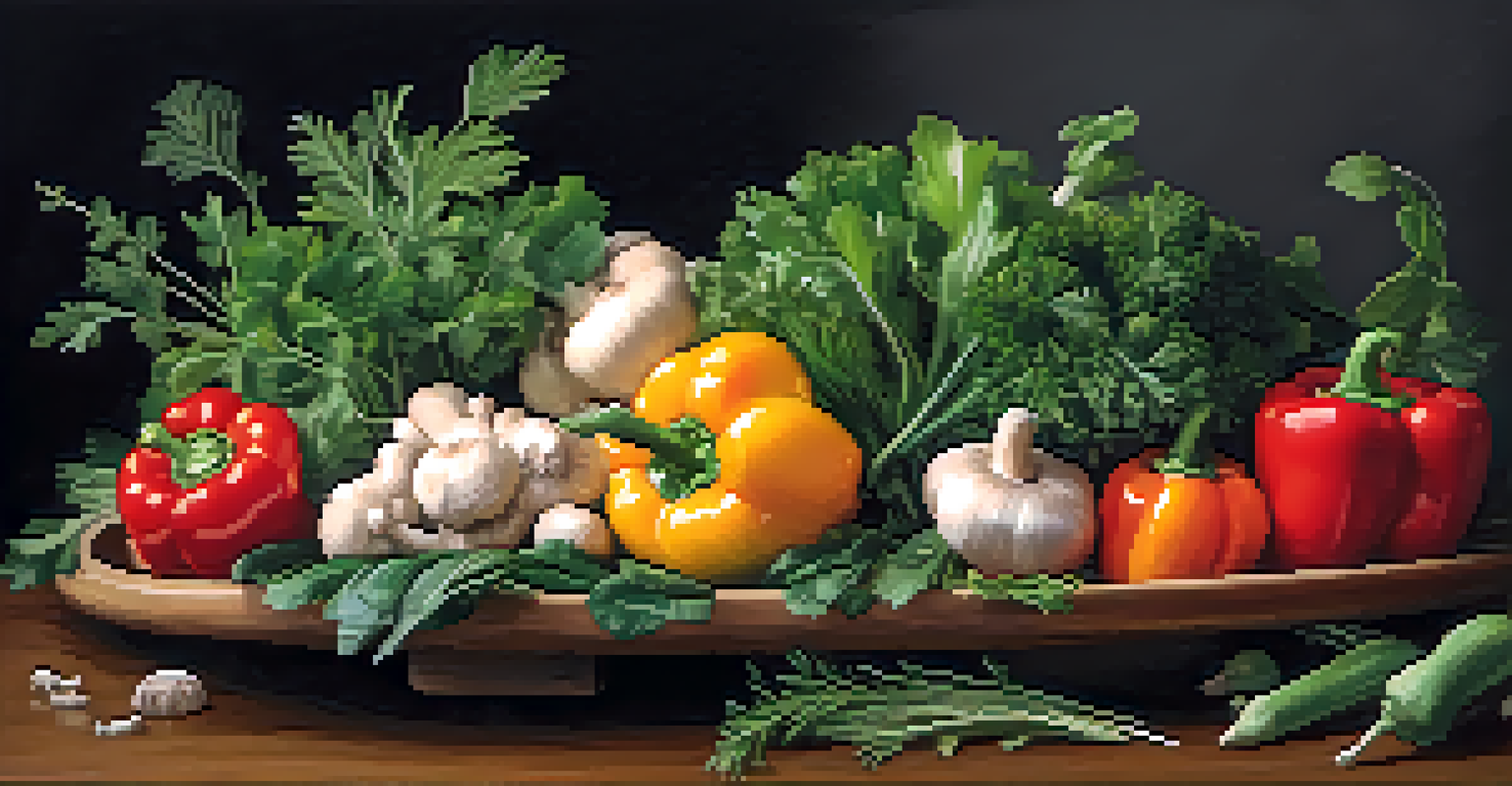How Chinese Cuisine Uses Vegetarianism to Showcase Heritage

The Roots of Vegetarianism in Chinese Culture
Vegetarianism in China has deep historical roots, often linked to Buddhist practices. Monastic traditions emphasized non-violence and respect for all living beings, which encouraged the consumption of plant-based meals. As a result, vegetarian dishes became an integral part of Chinese culinary heritage, showcasing a philosophy that values harmony with nature.
Let food be thy medicine and medicine be thy food.
Moreover, vegetarianism is not just a dietary choice but a way to connect with spirituality and cultural identity. Many Chinese families have passed down vegetarian recipes for generations, ensuring that the flavors and traditions remain alive. This food not only nourishes the body but also connects individuals to their ancestors and cultural heritage.
In modern times, this ancient practice has seen a resurgence as more people seek healthier lifestyles and sustainable eating habits. As a result, traditional vegetarian dishes are being reinterpreted, blending old and new culinary influences while preserving their cultural essence.
Symbolism of Ingredients in Vegetarian Dishes
Chinese cuisine is rich in symbolism, and many vegetarian ingredients carry significant meanings. For instance, tofu represents prosperity, while mushrooms symbolize longevity. The careful selection of ingredients for vegetarian dishes reflects not only flavor but also a deep cultural connection to auspiciousness and well-being.

This symbolism extends to the preparation and presentation of food. Dishes are often arranged in a way that reflects balance and harmony, essential concepts in Chinese philosophy. For instance, a well-prepared vegetable platter might feature colorful ingredients that represent the five elements, creating a feast for both the eyes and the spirit.
Historical Roots of Vegetarianism
Vegetarianism in China is deeply intertwined with Buddhist practices, emphasizing non-violence and respect for all living beings.
By incorporating symbolic ingredients, chefs pay homage to their cultural heritage while also conveying important messages about health and prosperity. This practice enhances the dining experience, inviting people to reflect on the deeper meanings behind what they consume.
Regional Variations in Vegetarian Cooking
China's vast geography and diverse cultures lead to a wide array of vegetarian cooking styles. From the spicy Sichuan dishes to the delicate flavors of Cantonese cuisine, each region has its unique approach to plant-based foods. For example, in Sichuan, vegetarian dishes often feature bold spices, while in Jiangsu, the focus is on fresh and seasonal ingredients.
We are what we eat. Food is not just fuel; it is an experience.
These regional variations not only highlight local produce but also showcase the creativity of chefs who transform humble ingredients into culinary masterpieces. Dishes like mapo tofu from Sichuan or Buddha's delight from Jiangsu demonstrate how regional flavors can elevate vegetarian cuisine, making it an exciting culinary adventure.
Exploring these regional specialties allows diners to appreciate the rich tapestry of Chinese culture through vegetarianism. It’s a delicious reminder that heritage can be celebrated in many forms, often reflected in the diversity of flavors and textures in each dish.
Festivals and Vegetarian Traditions
Festivals play a significant role in Chinese culture, and many of them feature special vegetarian dishes. For instance, the Lunar New Year is celebrated with vegetarian dumplings, symbolizing wealth and good fortune. These traditional foods not only bring families together but also reinforce the importance of vegetarianism in cultural celebrations.
During the Qingming Festival, families honor their ancestors with offerings, which often include vegetarian foods. This practice serves as a reminder of the connection between food, family, and heritage, highlighting the role of vegetarianism in fostering community and remembrance.
Cultural Symbolism in Dishes
Many vegetarian ingredients in Chinese cuisine carry symbolic meanings, reflecting cultural values like prosperity and longevity.
These festive traditions are an opportunity for younger generations to learn about their cultural roots through cooking. By preparing and sharing these dishes, families pass down knowledge and values related to vegetarianism, ensuring that these culinary practices continue to thrive.
Modern Adaptations of Traditional Vegetarian Dishes
While traditional vegetarian dishes are cherished, modern Chinese chefs are also reinventing these classics to appeal to contemporary palates. This innovation includes incorporating global ingredients or techniques, creating fusion dishes that still honor their roots. For example, a traditional stir-fry might be updated with quinoa or avocado, blending cultures while maintaining a connection to heritage.
Such adaptations allow vegetarian cuisine to evolve, making it accessible and appealing to a broader audience. As more people embrace plant-based diets, these creative interpretations can inspire new generations to appreciate the flavors and significance of Chinese vegetarian cooking.
Additionally, restaurants and chefs are increasingly focusing on sustainable practices, highlighting the importance of local and organic ingredients. This commitment to sustainability aligns with traditional values of harmony with nature, making modern vegetarian cooking a continuation of cultural heritage.
Health Benefits of Chinese Vegetarian Cuisine
Chinese vegetarian cuisine is not only delicious but also offers numerous health benefits. Rich in vegetables, legumes, and whole grains, these dishes provide essential nutrients while promoting a balanced diet. This focus on plant-based ingredients contributes to overall well-being, making vegetarianism a popular choice for health-conscious individuals.
Moreover, traditional cooking methods, such as steaming and stir-frying, help retain the nutrients in vegetables, enhancing their health benefits. By showcasing a variety of textures and flavors, Chinese vegetarian dishes encourage a diverse diet that supports a healthy lifestyle.
Modern Adaptations and Health Focus
Contemporary chefs are reinventing traditional vegetarian dishes to appeal to modern tastes while highlighting health benefits and sustainability.
As awareness of nutrition continues to grow, many people are turning to Chinese vegetarian cuisine as a flavorful way to improve their diets. This shift not only honors traditional practices but also emphasizes the importance of health within the context of cultural heritage.
The Global Influence of Chinese Vegetarian Cuisine
Chinese vegetarian cuisine has transcended borders, influencing culinary traditions worldwide. As global interest in plant-based diets rises, many international chefs are incorporating Chinese vegetarian techniques and flavors into their cooking. This fusion not only celebrates the uniqueness of Chinese cuisine but also demonstrates its adaptability and relevance in a global context.
Restaurants specializing in vegetarian Chinese dishes have become increasingly popular, showcasing the rich flavors and health benefits they offer. From dim sum to noodle dishes, these offerings appeal to both vegetarians and omnivores alike, drawing people together through a shared appreciation for delicious food.

Furthermore, this global influence helps preserve and promote Chinese culture, allowing others to explore its depths through vegetarian cuisine. It's a beautiful example of how food can bridge cultural gaps and foster understanding across different communities.